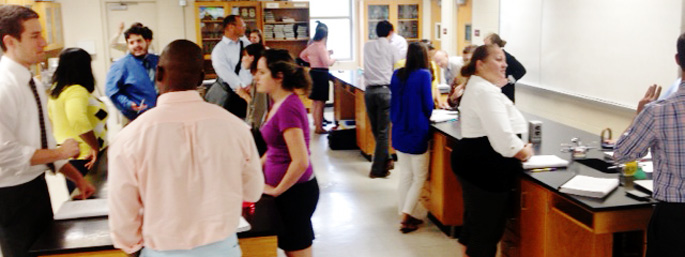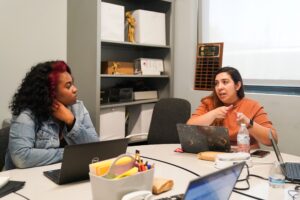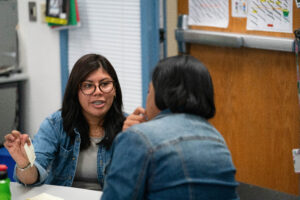Last Monday, I was in a classroom at Maplewood High School in Nashville, Tennessee, where 30 new teachers spent the afternoon practicing how to “narrate the positive.” They noted when things were going well, saying things like “Thank you, Juan, for quickly starting your Do Now” as a way to cultivate positive culture and student behavior.
 A few things made this particular school visit unique. First, the teachers, who are part of our Nashville Teaching Fellows program, were gaining important experience—but they weren’t practicing with students. They were trading teacher and student roles back and forth to practice “narrate the positive” on one another. The room was electric with energy as these newbies (they had just finished their sixth day of training) practiced again and again, receiving a new piece of feedback from their peers each time on how they could do better. It was the power of practice at its best.
A few things made this particular school visit unique. First, the teachers, who are part of our Nashville Teaching Fellows program, were gaining important experience—but they weren’t practicing with students. They were trading teacher and student roles back and forth to practice “narrate the positive” on one another. The room was electric with energy as these newbies (they had just finished their sixth day of training) practiced again and again, receiving a new piece of feedback from their peers each time on how they could do better. It was the power of practice at its best.
Second, I was with Doug Lemov and Erica Woolway from Uncommon Schools. Over the past two years, TNTP has worked closely with them to radically transform how we train our Teaching Fellows, using Doug’s Teach Like a Champion (TLAC) as a primary resource.
The basic premise behind our approach is this: teaching is like ice skating or ballet or basketball—to excel, you have to master the basics first. Just like great ball players don’t have to think about dribbling, great teachers shouldn’t have to remember to narrate the positive, give clear directions, speak in a strong voice or circulate the classroom. These teaching skills are so foundational, not having them down cold prevents teachers from acquiring more advanced skills later on. And that often leads to frustration, low performance and attrition. So the key to strong early-career development and long-term success is lots of practice on the basics, early on.
We also know that a teacher’s first year is incredibly difficult, and that teachers who get off to a strong start are less likely to struggle later. So our strategy for our first-year teachers, which we named “Fast Start,” is focused on giving them four critical skills right away, to serve as sturdy building blocks for a strong career in the classroom:
- Delivering lessons clearly
- Maintaining high academic expectations
- Maintaining high expectations for behavior
- Maximizing instructional time
Since we know we can’t possibly prepare our Fellows for every single situation they’ll encounter on the job (no teacher preparation program can), we’re incredibly selective in how we spend our time during training, when we compress and deliver a lot of instruction in five short weeks. From there, we build new skills atop those already mastered, based on the TLAC techniques.
Until we started “Fast Start” last year, we threw everything we knew about teaching at Fellows pretty much right away—from managing student behavior to differentiating lessons to building higher-order thinking skills—prioritizing nothing. While we felt our training was more practical than many university teacher education programs, Fellows still spent a lot of time reading and talking about teaching, rather than actually practicing important skills. They discussed classroom management, for example, but were never explicitly taught specific techniques or required to show they could use them. We assumed that if you knew the material, you could also do it.
We were wrong. After research confirmed that down the road, our Fellows were only about as effective as their peers from other prep programs, we decided to overhaul our entire approach. We prioritized the skills that were common among highly successful Fellows, and drew on research about the importance of practice.
Now, Fellows focus on critical skills—and they practice those all the time. They practice during sessions with their peers, they practice their lessons before they deliver them, and they practice with their coach to learn how to implement a specific piece of feedback. Walking through our summer training in Nashville, I imagine it feels like the practice field of the New Orleans Saints or the operating training rooms of Massachusetts General Hospital. A place where everyone is hyper-focused on learning the craft of their profession; where the prevailing belief is that through the hard work of practice and the genuine power of feedback, you get better.
We made these changes in rapid speed—we redesigned our training program last spring, piloted it last summer, analyzed the data last fall and rolled out an updated version across all 14 of our Teaching Fellows sites this summer. How is it going? Our early results are promising. As Doug noted, we are seeing some significant correlations between how Fellows perform at summer training and their school-year performance. We’ll be able to say more about that as the summer goes on—and we’ll share more details about how our Fellows are doing as they move through this incredible, challenging period, too. Stay tuned.








